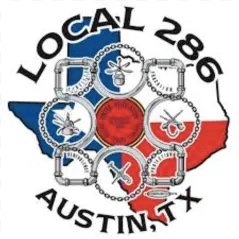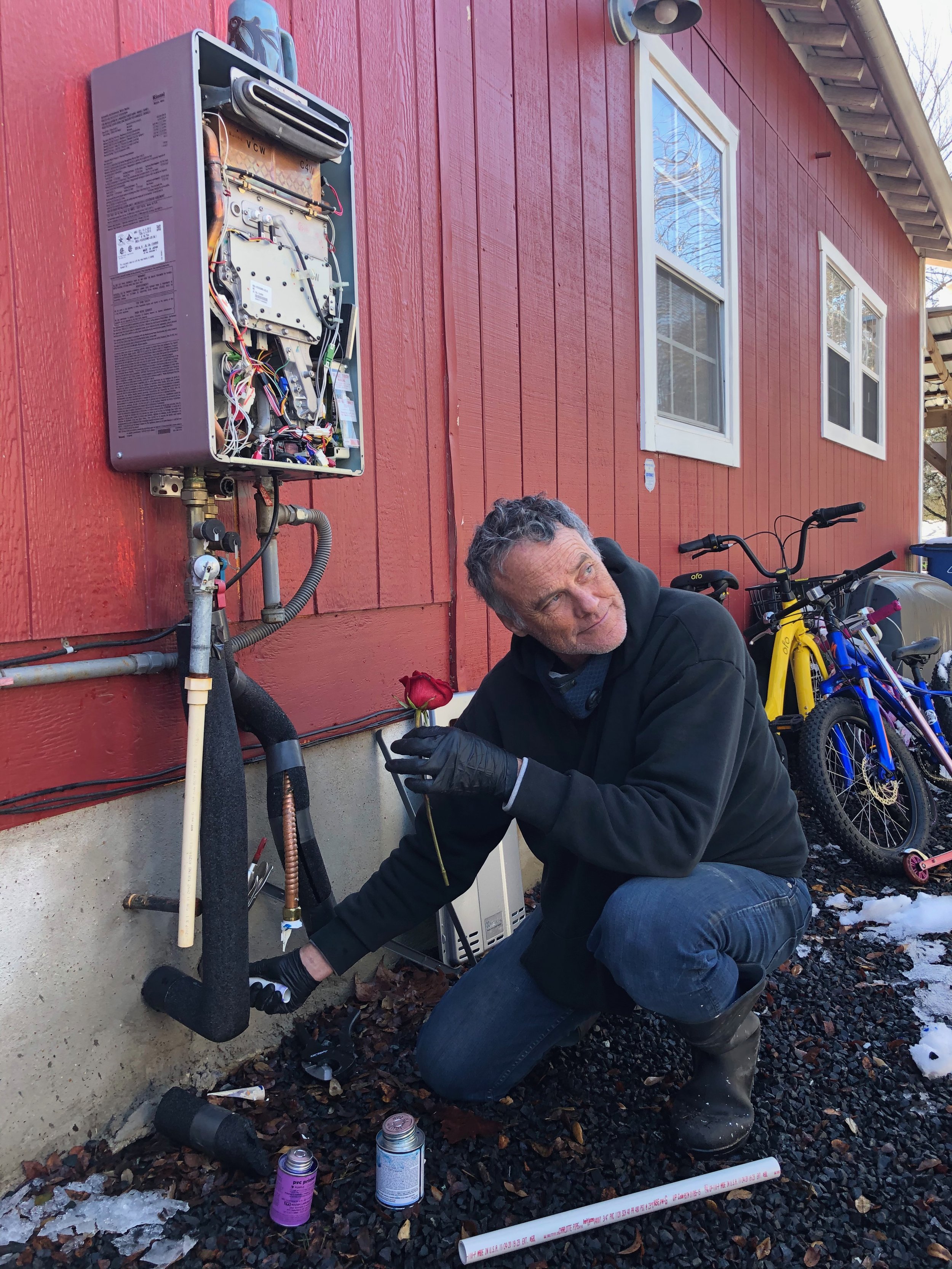Plumbing
Unlike carpenters, arborists, painters, and a hundred other trades, plumbers have a healthy union and a rigorous certification program. Unless you are a certified plumber, working under a licenced “Master”, you may not plumb. Once, I asked a plumber to come out and bid a repair to a water heater setup my inspector had alerted me to. It needed a new TPR valve, possibly a new pedestal, a drain pan, and exhaust vent. I didn't like the plumber or his price so I didn't hire him and the next week a city inspector visited my property and shut off the water heater. Plumbers have turf. They are like samurai. They expect to be treated a certain way and paid a certain way, and they demand exclusive access to certain types of work.
A Master Plumber is required to be involved for most types of plumbing, but you won't usually see them. The plumber that comes to your house is probably a journeyman or, more likely, an apprentice working under the license of a Master. It takes up to 10 years to become a Master and requires sponsorship, so it's not just a matter of work experience, it's a place in a social hierarchy. During that time, you have to maintain good relationships with your colleagues and pay dues literally and figuratively. For a while, I had a guy who had been a journeyman but fell out with his employer and worked under the table by himself. I liked him because he was very good, cheap, and he communicated well, taking the time to establish a rapport with me and explain how things worked. He wasn't afraid to say that the previous guy had done a bad job, or that I could probably do this myself. I miss that guy.
Since he disappeared, I've learned a lot about plumbing. First, plumbers are in high demand. It's normal for them to have a waitlist. Second, I can do a few things myself now. I am intimately acquainted with the spaces under my sinks, I can sweat copper ok, replace toilets, sinks, faucets, valves, but even handling the basic stuff myself, I know a few plumbers by their first names.
The water was shut off all over town because pumps had failed and mains had burst and any pressure in the system needed to be conserved. The city’s job was to get electricity restored to pumps, mains repaired, and pressure back. As days dragged on, it didn't feel inevitable that the temperature would go back up, it felt permanent. Each time I re-entered my own house, I wished there was a chamber where I could doff and don boots and coats without making the house cold, and I realized what I wanted was called a Mud Room. Austin’s architecture was as unsuited to the new cold as our wardrobes. We waited for warmth the way a child waits for their birthday, it couldn't come soon enough, but we did know, intellectually, it was coming, and we were almost as certain that, eventually, the power and water would come back on.
Those of us who were acquainted with plumbing knew that, when the water and warmth returned, burst pipes would create the next disaster, cascading down through floors and ceilings, making things wet that must never be wet: insulation, drywall, and electrical wiring. After a freeze that killed off an uncountable number of homeless people, we were about to create thousands more. The long drawn out crisis that followed could ruin lives and permanently change the nature of the city, I thought.
I thought about Hurricane Katrena and how New Orleans never really recovered. Houses condemned, neighborhoods destroyed and rebuilt as gentrified placeholders for what used to be there. It seemed possible.
trying to make the best of the inline water heater apocalypseI had a friend named David, a kind of a do-whatever carpenter/electrician/tarot-reader/dancer, something between a handyman and an autodidact. He was going around fixing pipes for people and I volunteered to tag along as an apprentice, thinking that helping someone more skilled than me would be more impactful than thrashing around on my own. He was primarily interested in tankless water heaters, because he knew many people who had them, because their thin, delicate copper tubes burst predictably in the same places, and because insurance companies considered them unrepairable and would pay for their replacement. Fix the unit, collect the payout, everybody makes money, landfills are conserved, wasteful consumerism is curbed. David is easy to assist because he thinks out loud and I can anticipate what he needs. Later, when asked about payment, he just says whatever you want to pay me is fine, I'm just out here getting people up and running, some of the people I help have no money and I'm happy to do it for free but I have to eat so donations are gratefully accepted. An arrangement is sorted out there in the driveway, each according to their ability, each according to their needs.
David, fixing pipes and breaking heartsThe first house we went to was one I’d driven past a thousand times. It's a nice house. It looks like it's owned by someone with a good job and eclectic tastes, or a hippy with a good side hustle. We removed the housing from the Navien unit and saw the predictable ruptures. I wondered how this house got on the list. Why aren't we helping a poor person? David knew Priya, it turned out. Well, I thought, in a crisis, one should help one’s self first, then family, neighbors, then community. I had thought I was moving onto the broader community, but it turns out my community is more of an onion. Priya brought us hot chai in hand thrown mugs to sip while we considered how to bypass the water heater to restore service to the house. Twenty minutes later, her two sweet kids brought us frozen raspberry treats shaped like flowers, which they had made out of things that were thawing in the freezer. Finally, before we left, we were each presented with a rose, slightly wilted, obviously re-purposed but, I felt, more than we deserved. Gratitude was these kids’ project.
I like to keep things separate and pure. This was something I was doing for secret virtuous reasons which I would not even name, lest their virtue be spoiled. I make money by charging people to live inside houses that I own. I take that money, pay off the mortgages, then keep charging my tenants and re-invest/hoard the surplus. I run in some anarchist circles and I get exposed to the idea that what I do is wrong, but it's a plan I made decades ago. This thing, helping people during a crisis, was to be separate from my efforts at personal gain. It was Charity. Like Pity, Charity used to be a nice word but our culture no longer feels comfortable with it. It means the world is inherently unequal and presents us with weakness and that makes us cringe. It is asymmetrical, accruing credit to the giver and obligation to the receiver.
The way David navigated compensation for doing a job after the fact made me dizzy. Even if I was not there as a volunteer, since it was in my community, my good deeds might come back to serve me later and would no longer be good deeds. To clarify my motivations, I administered the following moral interrogation to myself:
“Would you do all this stuff to help people even if no positive feelings of self-congratulation happened before, during, or afterwards?”
“Yes. Yes, I would.”
“Really, though?”
“That’s it for questions. ”
It appeared I would need to set thinking about being a good person aside as a priority if I wished to do any good. As backup motivations, I still had the desire to socialize with people, fear of societal collapse, and boredom.
This essay series is part of a project to document Texan’s experiences during the 2021 freeze. Do you have a story to share about the 2021 Texas freeze? Share it with my publication, Freeze Stories, on Medium. If its not filled with filth, I’ll publish it. Ok, I’ll publish it even if its filled with filth.

